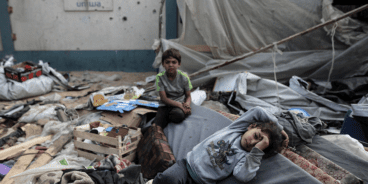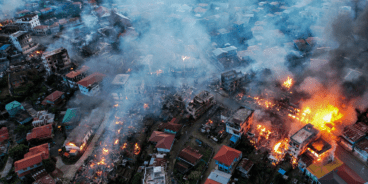
Joint NGO letter on the Framework of Cooperation between the Government of Bangladesh and the United Nations on addressing conflict-related sexual violence against the displaced Rohingya population from Myanmar hosted in Bangladesh
The Global Centre signed on to the following letter, together with 14 other organizations, regarding the situation in Burma (Myanmar) on 25 January 2019: Joint NGO Letter to the Office of the Special Representative to the Secretary-General on Sexual Violence in Conflict in response to the Framework of Cooperation between the Government of Bangladesh and the United Nations on addressing conflict-related sexual violence against the displaced Rohingya population from Myanmar hosted in Bangladesh and the Joint Communiqué of the Republic of the Union of Myanmar and the United Nations on prevention and response to conflict-related sexual violence.
Dear Special Representative to Secretary-General on Sexual Violence in Conflict Patten,
We, the undersigned organizations, thank you for your commitment and efforts to advance accountability for conflict-related sexual violence (“CRSV”) and to protect survivors of such crimes, including in places where impunity has long been the rule, such as Myanmar. We share this commitment with you.
Building on this shared commitment, we are writing to express our concerns and to suggest recommendations with regard to your Office’s engagement with the Governments of Bangladesh and Myanmar, in particular the “Framework of Cooperation on addressing conflict-related sexual violence against the displaced Rohingya population from Myanmar hosted in Bangladesh between the Government of Bangladesh and the United Nations” and the “Joint Communiqué of the Republic of the Union of Myanmar and the United Nations on prevention and response to conflict-related sexual violence”.
We appreciate your leadership on the need for accountability for CRSV in Myanmar to date as outlined in your address to the United Nations Security Council in December 2017.
“The widespread threat and use of sexual violence served as a driver and push factor for forced displacement on a massive scale, and as a calculated tool of terror seemingly aimed at the extermination and removal of the Rohingya as a group. […] I urge the Council to do everything in its power to seek a swift end to the atrocities, ensure that the alleged perpetrators of sexual and other violence [committed against Rohingya women and girls] are brought to justice and create conditions for a safe and dignified future for the survivors. History will judge our action or inaction.” (S/PV.8133, pp 4-5.)
With regard to the Framework of Cooperation with Bangladesh, our core concern lies with the commitment focused on national level documentation efforts of CRSV. We are apprehensive about encouraging further documentation in light of the current documentation of Rohingya experiences. We fear the Framework will initiate further documentation undertaken by actors lacking the necessary expertise, resources and coordination.
The uncoordinated documentation of CRSV in Bangladesh by multiple actors poses a security and health risk for the interviewed survivors of such crimes due to the absence of support services treating their medical and psychological needs and of effective physical protection from documentation actors. In addition, the result of uncoordinated documentation by multiple actors may potentially undermine upcoming investigation and accountability efforts by international justice mechanisms, such as the International Criminal Court (“ICC”), which are likely to have a policy to not interview survivors who have already been approached in the past in order to avoid security risks and re-traumatization of survivors, as well as potential unreliability of testimony.
Instead of encouraging further documentation around the National Human Rights Commission, we recommend that the implementation of the Framework focuses first and foremost on the implementation of adequate medical and psycho-social support structures for (CRSV) survivors within Bangladesh. Once such structures are in place, capacity and expertise of national level documentation actors should be strengthened, including training in documenting CRSV as well as training of translators or ensuring that translators of the required language and dialect are readily available. These are prerequisites before further documentation – in a coordinated manner – could take place.
Regarding the Joint Communiqué with the Government of Myanmar, as the report of the Independent International Fact-finding Mission on Myanmar (“FFM”) clearly outlines, Myanmar has a long and deeply entrenched history of impunity for grave crimes, including CRSV. This impunity has been compounded by the absolute failure of Myanmar’s authorities – civilian and military alike – to demonstrate any willingness to investigate or hold perpetrators accountable. While eight ad-hoc commissions and boards have been set up by the Myanmar authorities since 2012 with regard to the situation in Rakhine State, the FFM determined that none meet the standards of an “impartial, independent, effective and thorough human rights investigation.” The newly constituted Independent Commission of Enquiry for Rakhine has done nothing to allay these concerns. One of the four Commissioners is a Myanmar Government official who has previously stated that Myanmar had “no intention of ethnic cleansing” and the chairperson has stated that the Commission will not “blame or finger-point”, which is at odds with the pursuit of accountability.
Furthermore, the Government’s emphasis on the work of this Commission of Inquiry, coupled with its refusal to cooperate with and allow access to impartial, international experts and bodies, including the FFM, the Special Rapporteur on Myanmar and the ICC, raise serious concerns about the Government’s commitment to accountability. These concerns also fall in line with the policy that led to the dismissal of the appeal on behalf of the two Reuters journalists Wa Lone and Kyaw Soe Oo, the most recent attempt by the Myanmar authorities to hide the atrocities committed in Rakhine State.
Against this backdrop, we see a real risk of instrumentalization of your mandate by the Myanmar Government.
- We were heartened to see in your statement accompanying the Joint Communiqué that “the true test of commitment will be the concrete actions taken to ensure accountability for sexual violence crimes.” We could not agree more. Accordingly, we provide the following recommendations with respect to the work of your Office in Myanmar, as well as for your forthcoming mission to the region.
- We urge you to review the Framework Agreement as to remove the emphasis on national documentation and discourage further documentation until support services for survivors are in place. Once this requirement is met, the capacities and expertise of national documentation actors, including translators, need to be strengthened.
- We ask for clear benchmarks to be set for the Myanmar Government to advance the implementation of the FFM’s key recommendations on accountability (FFM report, para 1682), in particular to:- Pursue all credible allegations of human rights violations and crimes under international law through prompt, effective and thorough, independent and impartial investigations including a specific focus on the investigation, prosecution and punishment for acts of sexual and gender-based violence;- Ratify the Rome Statute of the ICC and accept its jurisdiction as of 1 July 2002; – Transfer all military and other security personnel alleged to have committed crimes under international law to civilian courts; – Reform the domestic judicial sector by strengthening the independence of judges as well as the qualifications and expertise of judges, prosecutors and lawyers;
– Incorporate domestic law sanctions for serious crimes under international law, serious human rights violations or violations of international humanitarian law.
– Ensure that the proposed Protection (and Prevention) of Violence against Women Law meets international standards and brings sexual violence committed by military actors under the ambit of the law, and is tied to broader necessary legal reforms, including of the Penal Code and the Constitution. - We invite the United Nations to undertake a coordinated and consistent survivor-centric approach towards the Governments of Bangladesh and Myanmar with regard to CRSV, through continuous engagement with the survivor community with the aim of understanding and identifying their needs, including medical as well as psycho-social support, and demands.
We would welcome the opportunity to meet with you and your team to discuss our concerns ahead of the upcoming mission to the region, as well as debrief afterwards. We would further welcome the opportunity to exchange with your Office on ways to highlight the importance of credible, survivor-centric accountability efforts for CRSV and other grave crimes in the region, and possible action points for the United Nations Security Council moving forward.
Signed by
ALTSEAN-Burma
Amnesty International
Center for Intersectional Justice
European Center for Constitutional and Human Rights
Fédération internationale des ligues des droits de l’Homme
Global Centre for the Responsibility to Protect
Global Justice Center
Global Network of Women Peacebuilders
Human Rights Watch
Impact
Interational Organization for Victim Assistance
Naripokkho
Odhikar
Rohingya Women Welfare Society
Women’s Initiatives for Gender Justice
Related Publications


